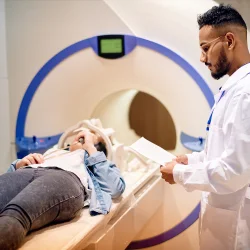Accident victims cannot seek compensation for pre-existing medical conditions or injuries. Yet, if the accident worsens an existing condition, you may seek damages for the resulting deterioration. However, seeking compensation for an aggravated injury may be complicated.
As a legal attorney with years of experience, I will explore the complexities of car accidents and pre-existing conditions, the legal framework that protects victims, and the steps you can take to pursue compensation.
Quick Summary
- Car accidents can aggravate pre-existing conditions, and the eggshell doctrine may entitle victims to compensation with help from a personal injury attorney.
- Disclosing your medical history, previous injury, or pre-existing conditions is essential for successful motor vehicle collision claims, as they can be subject to evaluation by insurance companies.
- Before the auto accident, any injury, illness, or existing medical condition is considered a pre-existing condition.
Can A Car Accident Aggravate A Pre-Existing Condition?

What Is A Pre-Existing Condition?
A pre-existing condition is any injury, illness, or pre-existing medical condition before the auto accident. This can include a wide range of health issues, from chronic back pain to traumatic brain injuries and other pre-existing medical conditions [2]. Insurance companies will often scrutinize your medical records regarding car accidents to determine if your injury was already present before the crash. In some cases, they may argue that your condition was not aggravated by the accident, making it more challenging to recover compensation for your losses. Disclosing pre-existing conditions to your attorney is essential to ensure the insurance company is aware of them in your claim. Failing to do so may hurt the outcome of your claim. The insurance company will be responsible for covering any treatment the person would not have otherwise required if a person's pre-existing condition was exacerbated in a car accident.
Related Article: Dealing With Insurance Companies?
Types Of Pre-Existing Conditions That Can Be Aggravated In Collisions

- Back injuries
- Traumatic brain injury
- Osteoporosis
- PTSD
- Depression
- Anxiety
It's important to be aware of the potential for aggravation of pre-existing car accident conditions and seek appropriate medical care immediately following the crash. Prompt diagnosis and treatment can minimize the impact of an aggravated condition and strengthen your personal injury claim."Proving liability for accident injuries can be harder when the victim has a pre-existing condition or injury. The insurance company, judge, or jury must decide if the accident caused the problem to worsen, or if it would have worsened anyway."- John Hipskind, Private Sector Defense Attorney at Hipskind & McAninch.Read Also
: What Doctor to See After a Car Crash?
Making A Claim For An Aggravated Pre-Existing Injury

Defining the Eggshell Doctrine

How Does The Eggshell Doctrine Protect Victims With Pre-Existing Conditions?
The eggshell doctrine protects victims with pre-existing conditions by holding defendants liable for all damages caused by their negligence, regardless of the victim's pre-existing condition. The eggshell doctrine guarantees that victims can pursue compensation for their medical bills, lost wages, and pain and suffering caused by accidents.Related Articles
:
- Common Causes of Collisions
- What to Expect After You Leave the Hospital After a Car Wreck?
- What To Do After A Fatal Car Accident?
See all related personal injury and accident lawsuits our attorneys covered so far.
FAQs
Can I Recover Compensation For A Pre-Existing Condition?No, you cannot recover compensation for a pre-existing condition. Such conditions do not qualify for reimbursement. However, if the accident aggravated your pre-existing condition, you may be eligible for compensation under the Eggshell Doctrine.How Can I Prove My Car Accident Injury Wasn't A Pre-Existing Condition?You can prove that your car accident injury wasn't a pre-existing condition by providing your complete medical history and having doctors testify on your behalf.What If A Car Accident Aggravated My Pre-Existing Condition?If a car accident aggravated your pre-existing condition, you may be eligible for compensation under the eggshell doctrine. This legal principle holds the defendant liable for any damages resulting from their negligence, regardless of the victim's pre-existing condition.
Seek Legal Assistance for Accident Claims Involving Pre-Existing Conditions
If you have a pre-existing condition and are involved in an accident, be helpful to get legal help from experienced attorneys. They can help you with your accident claim and increase the amount of compensation you receive.At Schmidt & Clark, LLP, our personal injury attorneys know much about personal injury law. They can help you build your case against the defendant(s) and insurance companies. This can prevent your claim from being rejected or getting less money because of your pre-existing condition. Contact us for a free consultation.Contact Schmidt & Clark, LLP for a free lawsuit consultation.
References:
- https://www.law.cornell.edu/wex/eggshell_skull_rule#:~:text=The%20eggshell%20skull%20rule%2C%20also,defendant's%20negligent%20or%20intentional%20tort.
- https://www.healthinsurance.org/glossary/pre-existing-condition/
- https://lab.mlaw.gov.sg/files/Accident-Personal-Injury-Publication.pdf

 Published by
Published by